Remove Lockhart, Morris, and Montgomery From Your Credit Report Quickly
Lockhart, Morris, and Montgomery are notorious for violating the Fair Debt Collections Practices Act (FDCPA) and engaging in crimes such as harassment, making threats, and contacting neighbors and family to slander alleged debtors' reputations. Many people getting this treatment don't even know who this company is and are surprised to learn they claim they've bought debt with their target victim's name on it. But buying debt? Why is this happening at all (let alone rampant)?
Believe it or not, there is no lawful money in circulation by the strictest standards. The result is a debt-based system of " tender" which functions as "money of accounting" and not "money of exchange." That's according to an affidavit by a former Federal Reserve lawyer and expert witness, explaining that a misperception about the nature of the money supply has been promoted – especially since the 1930s when the gold in general circulation was confiscated at gunpoint by the FDR administration.
The result is a system of debts that can't be fully extinguished – only perpetually set off – leaving in its wake an aberrant -financial system that operates off of presumptions, assumptions, and color of law. The silver lining is that even seemingly serious financial and issues are often best handled by skillfully questioning the basis of debt claims.
DoNotPay can ask the right questions to reveal the sham and make thugs like back off in a heart-beat – and clean your credit report at the same time!
What Is Lockhart, Morris, and Montgomery?
Lockhart, Morris, and Montgomery purchase debt claims for student loans, healthcare, the alarm industry, and commercial freight. They are registered in the state of Connecticut and the state of Nevada as a "foreign corporation."
The front page of Lockhart, Morris, and Montgomery reads: "Finding success through compassion while operating on the principles of goodwill and service."
With your help, DoNotPay wants to hold them to their motto.
Lockhart, Morris, and Montgomery Contact Info
Lockhart, Morris, and Montgomery have several addresses around the country. Here is their contact info if you need to return any courtesies:
| Address (1) | 1401 N. Central Expressway, Suite 225, Richardson, TX 75080 |
| Address (2) | 833 E Arapaho Rd Ste 210, Richardson, TX 75081-2246 |
| Agent Business Address | 50 Weston Street, Hartford, CT 06120 |
| Phone | (877) 214-3355 |
| Fax | (214) 522-6571 |
| Website | Online Contact Form |
It's important, though, to read the rest of this article before communicating with them. You don't want to make the situation worse by saying the wrong thing.
What if Lockhart, Morris, and Montgomery Contacts Me?
In our debt validation series, we cover more fully how to use written communication with a debt collector in an advantageous way. As you may have experienced, almost nothing good can come of talking to a debt collector on the phone.
If they call you, ask the phone representative to give their full name, since they want to discuss private data so badly. They probably won't give it to you, which allows you to say, "I only conduct business with those I know and not with those who refuse to identify themselves. Have a good day," and then hang up. If on the off-chance they do give their name (or a fake name), tell them you will need to have a background check done on them before deciding if you'd like to discuss any business or other matters with them.
If they contact you further, you can tell them not to call you. Under the Fair Debt Collection Practices Act (FDCPA), to do so is harassment. It's important, though, to do something else behind the scenes designed to prevent them from resorting to a lawsuit. In our debt validation series, you can learn how to further use the FDCPA to force them to validate their claim, which they can rarely do – and simply providing bills with your name on it does not validate a debt.
They need a signature and proof that the original creditor gave you something of value in exchange for your signed promise to pay. This will keep them from being able to send demand letters to you if done correctly.
Mail Can Function as Notice
Not many people know that using the mail system to send mail to a fictitious or assumed name is a violation of Title 18, § 1342. It's constantly done, though, because not enough people press the issue. You can make Lockhart, Morris, and Montgomery heed this and only use correct grammar when addressing you (which "all caps" lettering most definitely isn't – not according to the government's court-document publishing guidelines). Bringing this topic up in the lower courts will not help you, and they simply flaunt their own rules about it – but in your private affairs, you can and should set the standards yourself.
Also, beware of even accidentally breathing life into debts that may have expired. Though debts do expire, debt collectors are not prohibited by law from trying to collect – merely from suing over the matter. If anyone you don't know tries to communicate with you, ask who they are, who they represent, and whether or not they can prove what they are saying before anything else.
For further help with written correspondence with Lockhart, Morris, and Montgomery. see DoNotPay's debt validation services, like sending a dispute for your credit report. Here, we'll discuss what to do if they've already tarnished your credit report.
What Should I Look For in My Credit Report?
Lockhart, Morris, and Montgomery will show up as "LOCKHART,MORRIS & MONT" on a credit report. Typically, their entries relate to:
- Late and missed payments
- Charge-offs from their clients
- Attempts at collection
These are often for debts people aren't even aware of or aren't theirs. Often, medical companies don't bill insurance companies properly, then pin unpaid charges on unsuspecting customers who never even know there was even an issue.
In such cases, the customer sometimes finds out that the medical company does not even have a record of such debts and discovers they even agree with the customer – leaving one to wonder whether LMM is in the habit of purchasing "debt lemons" all along but refuses to admit it.
How to Dispute Entries by LMM on Credit Reports
Start by looking for obvious errors like misspellings, incorrect addresses, or payments that were made. If an account listed is not even your own, all the better. Debt collectors have been known to include accounts for spouses, ex-spouses, and family members. Compile these more egregious errors and think throughout the rest of the process how it can fit into the most damning narrative possible (e.g., that the errors are so voluminous that all LMM entries – not just some – are questionable). Think too of how you will present your conclusions to either or all relevant parties listed below:
- Lockhart, Morris, and Montgomery
- Credit Bureaus
- The Federal Trade Commission (FTC)
Consider the advantages and disadvantages of communicating with any of these three as you frame your error dispute research into a cohesive narrative. Error disputes with the credit bureaus are free and unlimited, but if it doesn't work, it could go into your report as yet another negative entry. Getting the FTC involved to your advantage could shut the whole thing down in a top-down way, but it's a bit harder to do and may require signing things under penalty of perjury.
The principles behind debt validation will apply here, where you hold a company to the strictest standards of proof without backing down. Lockhart, Morris, and Montgomery are nearly constantly getting sued for violating debt collection practices, and it may leave them vulnerable to outright restrictions on their functioning as a business at all if you can help us keep up the pressure.
If you can honestly poke holes in their reports, you would do well to look into pressuring them with debt validation and pressuring the credit bureau(s) they've reported to with both formal and informal "error resolution" processes.
Dispute the Error
Look through the questionable credit report in detail for any errors at all, including the following:
- Payments that were probably paid
- Negative entries that have expired (7 years old, most often)
- Activity from spouses or family members being wrongly attributed to you
- Wrong account numbers (make sure you don't tell them if the account is correct, though – instead, use it as leverage to highlight their inaccurate record-keeping in general)
- Unrecognized accounts – especially if you can get the original company to give you something in writing confirming there was no such account (or no such account as LMM has listed)
- Provably incorrect account balances
- Wrong addresses (wrong phone numbers usually aren't that helpful to point out, unless in the context of much more serious issues)
- Unrecognized companies you never had any dealings with
When you notify LMM and/or the credit bureau(s) of these errors, keep a record of their responses. If they deny the obvious, it would be useful when you take your issue one rung higher to the credit bureau and/or FTC (respectively). At that point, you can use their denials of the obvious to show that they are acting maliciously, not just erroneously. This could also give you the leverage necessary to escalate your demand from removing a few entries to removing the entire company's activity in full.
This is what DoNotPay can make easier and practically automatic for you, whether it's removing late payments, credit score inquiries, or collections activity that you're after.
Formal Error Dispute Processes
When submitting to the credit bureaus error dispute process to fix your credit score, they try to bully people into giving more information than necessary – they are in the private business of collecting data, after all. Know that compelling disclosure of Social Security Numbers (SSN) is a felony. This is done all the time, though, because people voluntarily do so without protest.
You can tell them that the Social Security Administration (SSA), from its inception, explained that the SSN must not be wantonly given out or used as identification and that any use of it is strictly between you and the SSA. Or more simply put, explain that you don't give out an SSN under the law – and you can fill the awkward silence by calmly asking them to ask you for an alternative means of identification.
If they bully you into giving your SSN in exchange for proper error resolution, you have a record of them committing a felony, and it's always possible that the cultural tide will shift in favor of the fourth branch of government (namely, you!).
Alternate Methods to Dispute Errors
You don't have to sit and wait for their cookie-cutter error dispute process to churn its gears. They have incentives to deny claims and it can harm your report. As we'll discuss below, you can – and should – go outside of the main channels and seek to get your error dispute documents and/or goodwill letter into many different hands at the companies you're contending with.
The Goodwill Letter
Goodwill letters are used to respectfully request that the company and/or credit bureau remove negative entries on your credit report due to error or hardship. The best ones have undeniable proof – or at least evidence – of the error or hardship. To this end, it may be enormously helpful to draft a basic letter you can ask sympathetic rental agencies and creditors to sign if they deny you essential services due to a negative credit report. That way, you have tangible proof of exactly how the negative entries are creating duress in your life. Beyond this, a great goodwill letter will have clear records of issues in your credit report and with equal clarity ask them to either remove the entries or lower their severity in some way.
The tone should be as respectful and clear as possible while also showing the potential for liability if they don't take action. Even the court system cannot simply drill you into poverty, and there are laws requiring them to accept offers of partial payment if full payment would reduce you to irrecoverable poverty. The credit bureaus and debt collectors most certainly don't have any more power to do this themselves – but as with any law, it can only protect you if you speak up.
Make sure the letter also states how the negative entry is causing harm to your life (but don't exaggerate and be ready to prove everything you say). Many people are so used to things like civil code infractions and fines that they forget that a "crime" in the strictest sense means someone was injured or their property was damaged. Show that you are going beyond mere paperwork games and matters of "infractions" by including proof that their actions are causing you physical and financial hardship that was (in part or in full) the result of their violations of the FDCPA, FCRA, or any other public laws you might find in your research.
On the other hand, a goodwill letter can also serve to simply ask for forgiveness and a reduction in credit report penalties. This is best if you don't exactly have much evidence of wrongdoing, but the credit report is still preventing you from obtaining things that you need. This may be more useful to you if the debt claims are valid, and the company technically stayed within the cold letter of the law, but they nevertheless have shown some near-illegal tendencies, are facing myriad other lawsuits, or if you can show that the original creditor is on your side in some way.
With debt collectors specifically, you can even increase the odds of getting them on your side by entering into some form of a payment plan, negotiating a reduced payment amount, and so on, in exchange for retractions of negative credit report entries. At the end of the day, they are just trying to take what they can get. If you've done this, you can use it as leverage with the credit bureau(s) to show further why your goodwill letter requests should be granted. You may want to send a debt validation letter as well.
Above all, if you can synthesize the attitudes of graciously giving the company staff a chance to save face and hardcore, take-no-prisoners assertiveness, you will be more likely to overcome. Give them a chance to save face, and it's more likely that they just might choose to.
How to Apply These Tools to Dispute a Credit Report
With your debt validation, error dispute documents, and goodwill letters at your disposal, think about how they will be cohesively used together. Above all, you are imploring the people in the business(es) you're addressing to work with you and hold themselves to the highest levels of accuracy – that's all. Let this be your bedrock "sticking point" under any circumstance. If they try to get you off track or drag you into collateral issues, relentlessly bring it back to the matter of perfect record-keeping and accuracy.
If this disrupts business as usual for them, then that's a problem of their own making. Why weren't they already prepared with accurate records if leveraging financial records for private gain is all they even do all day? To overcome the likely attitude they're going to give you, it can be useful to treat the experience as a lesson in justly giving someone a hard time. It's what they do all day, and since most people are too nice to act that way themselves, debt collection agencies can be more sensitive than it appears once you firmly shut down their lame excuses a few times.
As for who to give aim that well-mannered hard time at, look into letter campaign methods such as the "saturation technique." It's a technique developed by credit-repair gurus that amount to getting your well-drafted documents into the hands of as many people as possible – and more importantly as many different types of people as possible – at the company or bureau you're trying to chip away at.
You can follow the formal processes for error disputes for what they're worth, but it's not going to get your case to stand out from the crowd on its own. Remember you are not dealing with a "company" – that would be a building or a couple of pieces of paper, and hardly anything more. You are dealing with the people who work at that company, and nothing is stopping you from communicating with them at your leisure.
Imagine how the effect of your documents and credit dispute letters might bring your issue to the attention of high-level decision-makers who make simple cost-benefit decisions all day long. How can you show them that you may be a costly thorn in their side, and continually escalate the dollar amount (and time) your issue may cost them? Summon your confidence and repeatedly press the central issue – the law requires that you either verify your records or drop your harmful, unfounded claims of debt against me – until they finally put up or shut up.
How to Remove Lockhart, Morris, and Montgomery Credit Report Entries Yourself
Getting rid of LMM credit report entries can boost credit scores by up to 30 points! However, getting LMM to agree that they were in error is usually tough unless you have the most obvious proof of the error. If you can do this, it will negate the need to deal with the credit bureau.
If you can't get LMM themselves to agree, you can go over their head and address the matter with the credit bureau themselves. Unfortunately, these family-owned data-mining companies (aka "credit bureaus") can be equally hard to budge. Fortunately, they are part of the larger administrative pecking order, and an FTC identity theft affidavit can eviscerate even mildly flawed claims of debt.
If you have to go this far, you'll undoubtedly want the most streamlined way of filing company complaints, which DoNotPay can also help you with. Just remember in all your dealings with debt claims that you have three tiers you work with to get your credit report cleaned up: the debt collectors, the credit bureaus, and the FTC.
Above all, accept nothing less from LMM than proof that they or their client:
- Gave you valuable consideration (money, goods, or services) in return for your signed promise to pay
- Included in their agreement with you is a clause allowing them to involve the services of third-party debt collectors like LMM
- Provided legally sufficient and timely notices and demands and that they were addressed correctly
Alternatively, most debt collection-related entries are automatically erased after seven years. This goes back to the times of "biblical law", believe it or not, and some even believe there is a 70-year cycle of so-called "debt forgiveness" that the self-imposed banksters secretly apply on a nationwide scale. Strange times, we know.
Send demand letters to for an Unresolved Credit Report Dispute
An ace card that can be played if communication with them is going nowhere is to get the attention of the most high-ranking employee you've been communicating with and demand to know the company's owners names, current mailing address, and title. Let the energy sink in, then tell them it's because you have to send them formal service of process since their underlings couldn't do this the easy way.
Enjoy the moment just a bit as their career flashes before their eyes, get the info, and tell them they can wait to hear from your AI Consumer Champion. (Don't say the robot part.) They may come back almost right after ready to give you at least some of what you'd been asking for all along. We're not suggesting you do anything but bluff about it, though. DoNotPay can help you with our streamlined small claims court service – but if it works to prevent that from happening, that's great too.
Lockhart, Morris, and Montgomery have been sued even more than most debt collection agencies, and it may even be possible to start going for the jugular and trying to shut down their ability to even do business. Most of the time, these types of companies just have an in-and-out short afternoon in court where they are just barely even punished or restricted from violating the FDCPA all over again – but in LMM's "case", they are even having to present in front of juries and are almost constantly being sued. It lends credence to the many online reviews that highlight their particularly abusive communication habits and slanderous badmouthing of alleged debtors to their family and neighbors.
At this point, you'll want to dig deep into the FDCPA and the FCRA – as well as any other relevant laws you find in your quest. Debt collection companies have strict debt collection standards they need to be reminded of from time to time, and that's particularly true of this one.
The damages LMM often faces for violating the FDCPA and FCRA normally include:
- Fines of up to $1,000 (each) for violating the FDCPA and the FCRA
- Any wages lost and other proven damages (with no limit beyond your ability to prove them)
- Possible punitive damages (as decided by the ministerial clerk, aka judge)
- Compensation for related court costs
How to Repair Your Credit Report if You Can’t Do It Yourself
Whatever route you take with these matters, it can be a steep and time-consuming learning curve – especially when you are already getting your time wasted by a bunch of pencil-pushing bullies. But it has to be done. What's the middle way, so that you can live your life and receive justice?
You don't have to do this alone. Look into some of the many independent law research groups both locally and nationally, with new ones popping up all the time. They all have different, unique insights and even more unique motives. Sometimes, though, this can become just another rabbit hole as you sort out claims that are too good to be true, groups who are a little blinded with idealistic bents, and even groups that are perfectly intelligent and correct in their research and yet lack a strict sense of what, above all, will simply work?
Enter the world's first AI Consumer Champion!
Scrub Your Credit Report Free of LMM With DoNotPay!
We commend you if you've stood up for yourself, no matter what the outcome was! The world needs more people like you. All the more, the world needs people like you to achieve their -financial goals more easily so you can teach others how to do the same and help lift each other.
DoNotPay wants to streamline as many of these presumptuous -administrative matters as possible, and we've got countless services that can help clean credit reports, knock off fraudulent debt claims, and help you be on your way. If are giving you problems, you can use all of DoNotPay's services for less than 1/10th of an hour of the average unscrupulous lawyer's time!
If you want to clean up your credit report but don't know where to start, DoNotPay has you covered in 3 easy steps:
- Search Clean Credit Report on DoNotPay.
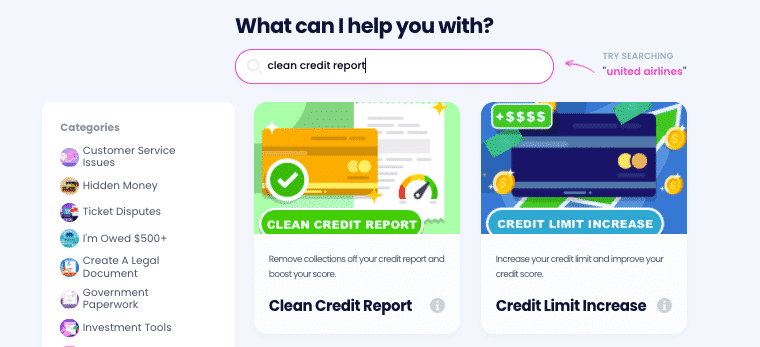
- Prepare a recent copy of your credit report that you can use as reference.
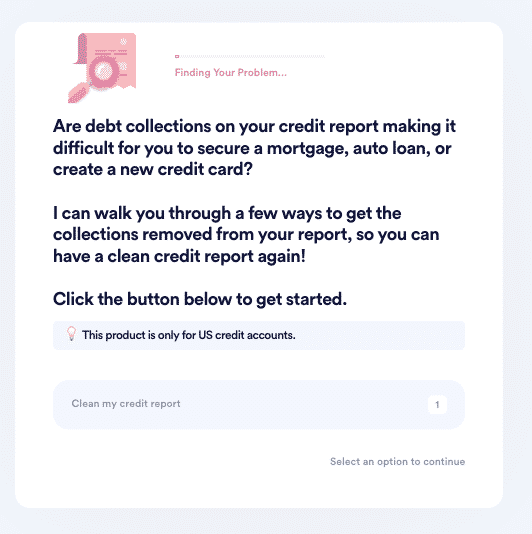
- Let us guide you through the 4 potential options:
- If you've already paid off your debt, we'll help you file a Goodwill Removal Request to get it removed.
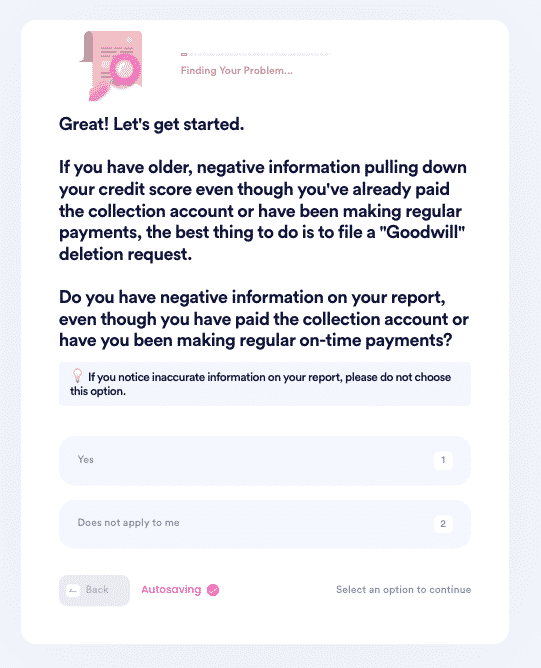
- If you notice any errors in your report (we have a list of common errors you can use!), we'll help you file a credit dispute to the creditor or major credit bureaus.
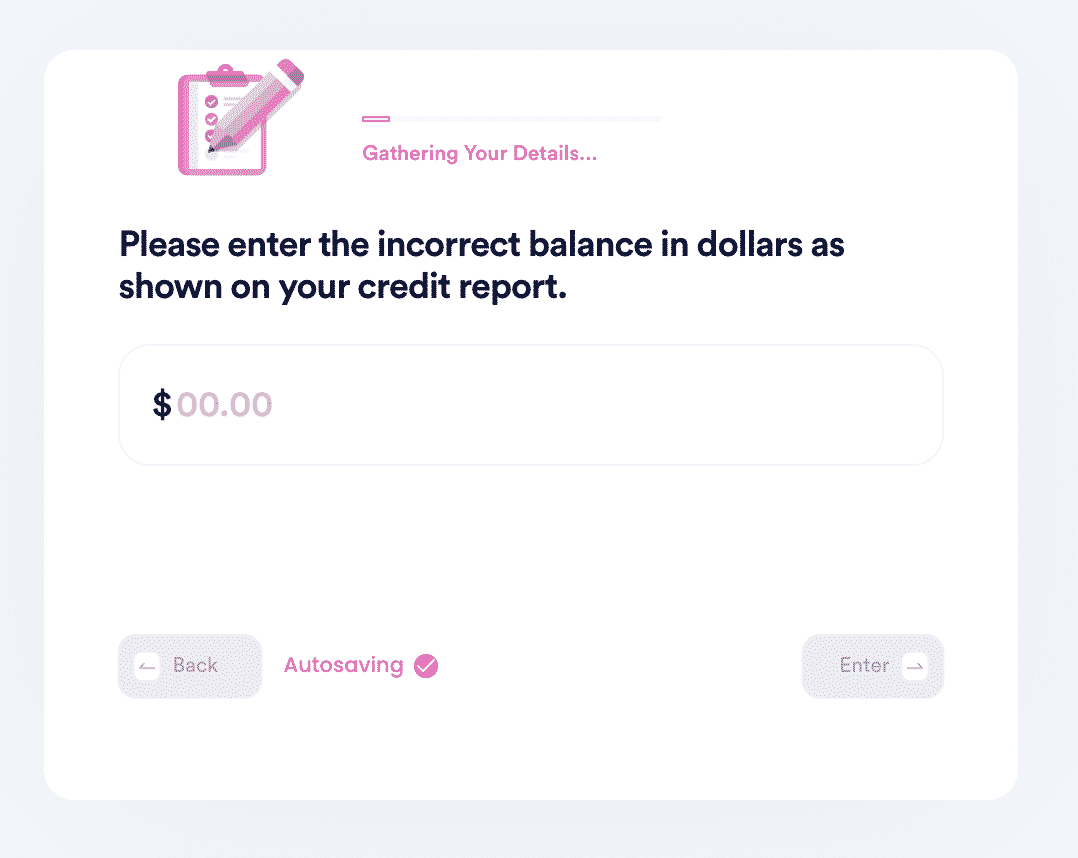
- If there are no errors, we'll check if you're still eligible to file a debt validation request. If they can't validate your debt, they're required to remove it from your report and they can't collect it!
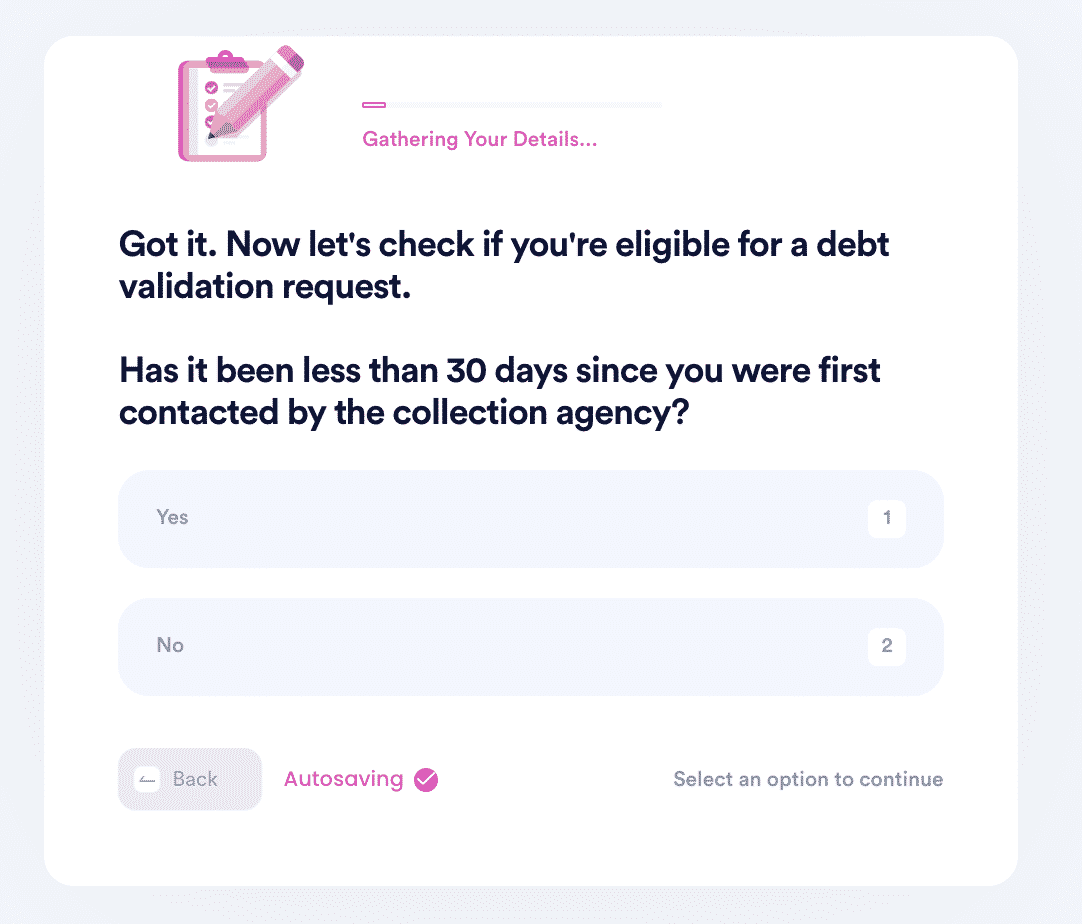
- Lastly, if none of the above options work, we'll help you file a pay-to-delete negotiation letter. You can customize the amount you are willing to pay in exchange for getting the item removed.
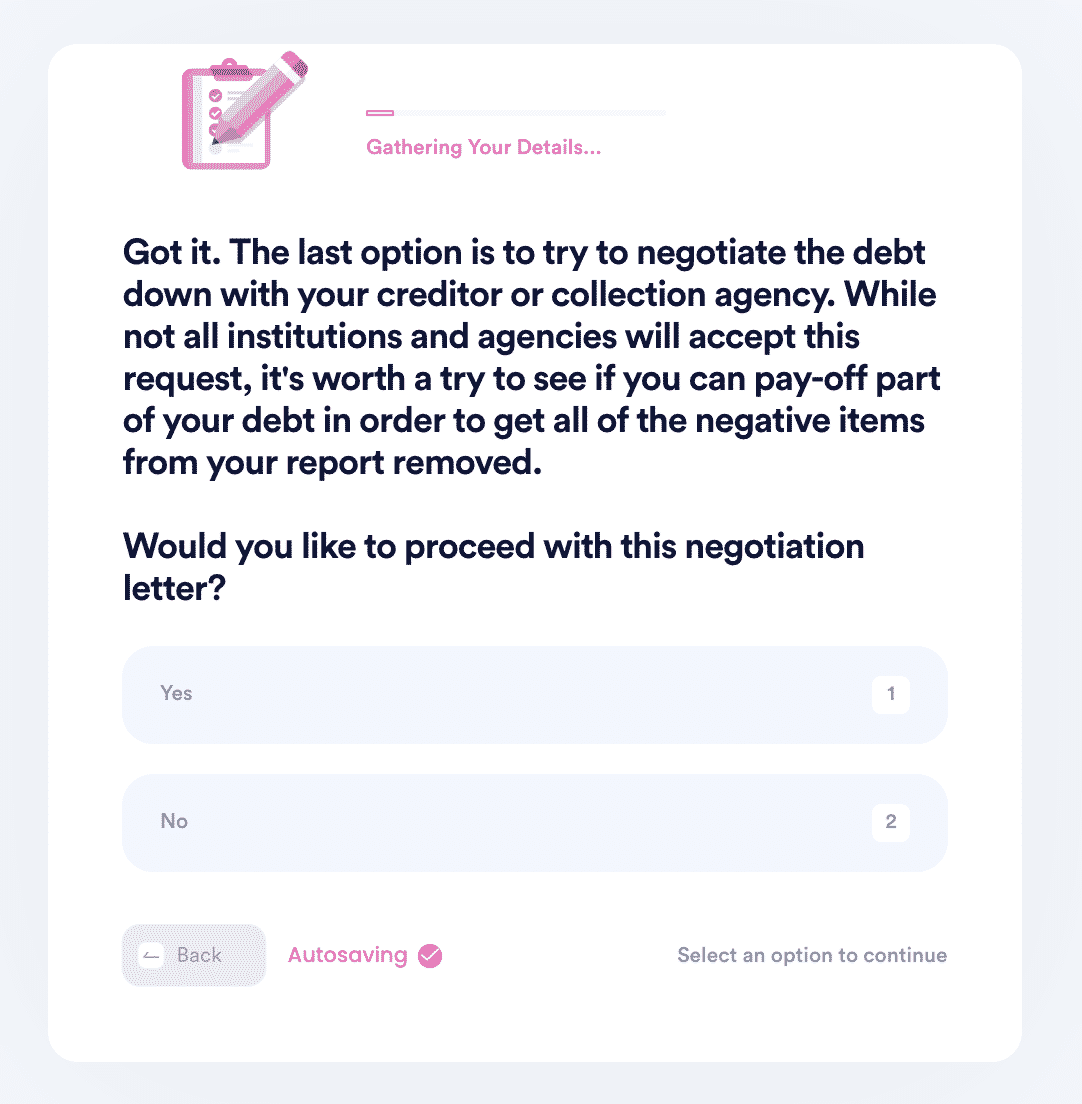
You can also check out our other credit products, including Credit Limit Increase, Get My Credit Report, Keep Unused Cards Active, and more!
Why Use DoNotPay to Clean Your Credit Report?
With any -administrative issue – and then some – DoNotPay is all of:
- Fast—Spend mere minutes, not hours, inputting the details of your unique issue with LMM
- Easy—By streamlining the process, you don't have to learn as much as you think you do
- Successful—We've been bringing all manner of even extremely difficult and financial issues to a harmonious close
DoNotPay Works Across All Companies With the Click of a Button
We can provide the same credit reporting services for any negative entry in your credit report and with any debt collection agency that is damaging your financial health. Not only that, but DoNotPay can help you simplify bureaucratic messes in countless other ways as well!
What Else Can DoNotPay Do?
For the same low rate, you can continually call on DoNotPay to automate and streamline countless other issues, including:
We also notarize documents, file complaints, and so much more. Not only are we here to give you educational resources to simplify the increasingly 2D whirled – we are here to minimize it and keep it out of people's way completely!
 By
By